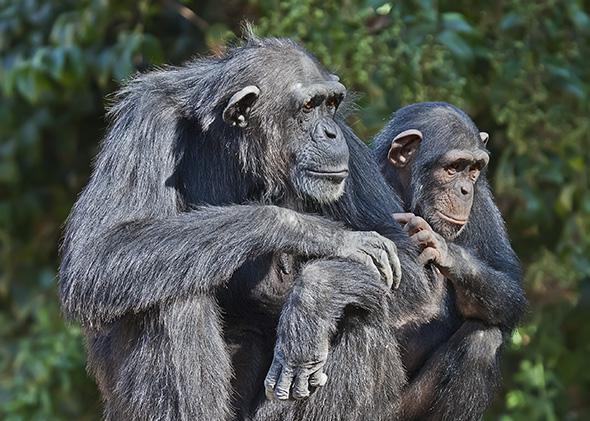As train stations and airports fill and roads clog before Thanksgiving, many families prepare to welcome back home children they dropped off at college two or three months ago.
Complicated mammals that we are, moms, dads, and other family members react to offspring dispersal from home (that’s what we animal-behavior types call it) in a variety of ways. And leaving for college is only one example of dispersal: A child may join the military or cross the country to take up a job. Judging from my own experience two years ago when my daughter left for college, it’s wrenching on the heart for some of us: We veer from feelings of loss and nostalgia to feelings of pride and excitement as our young ones venture out into a wider world.
As an anthropologist who studies the expression of emotion in nonhuman animals, I can’t help but wonder how these events and the emotions that accompany them fit into an evolutionary context. We know from scientists’ observations that other animals, including close kin such as chimpanzees, bonobos, and gorillas, express emotions ranging from joy to sorrow. In my book How Animals Grieve, I show that these primates and other animals too, ranging from monkeys and elephants to cows and birds, may express deep grief when a friend or relative dies.
We know too that as a rule, in wild mammalian populations, offspring from one sex, or sometimes both, transfer from the natal (birth) group at puberty to live and mate in a new group. The outcome of this pattern of dispersal is a constant and healthy flow of individuals—and their genes—in and out of the social units in which animals live.
In chimpanzees, it’s the daughters who leave. In many monkeys, including baboons and macaques, it’s the sons. In gorillas, it is often both.
Primate kids who leave home, then, are part of an evolutionarily favored pattern. What might our closest relatives feel, I have wondered, when a young family member leaves home?
I put this question to animal behavior expert Richard Byrne of St. Andrews University in Scotland. “Given that chimpanzees, bonobos, and gorillas are so closely related to humans,” he wrote me in an email, “and presuming that our emotional system is phylogenetically quite ancient in the mammalian lineage, I’d think it most unlikely that ape mothers would not feel some sort of sadness when their daughters leave their natal group.” But that doesn’t mean he was as intrigued by the question as I am. “On the other hand, I’m afraid I do not think this is a testable question—or perhaps I just lack the imagination to see how it could be tested—so I am not convinced that it is a valuable one for scientists to worry about.”
Are we at a dead end with my musings, then? I’m not so sure. Some questions about what other animals feel may not be answerable scientifically. But their behavior can give us an indication of their internal state. I know it’s possible to suss out animal mourning with good scientific detective work—by defining grief clearly, then comparing a survivor’s behavior after a companion has died with the time period before that death. In a similar way, I believe we may find some surprising things by contrasting apes’ actions before and after the emigration of their offspring.
An anecdote Byrne recounted to me suggests two things at once: It is possible to look for the expression of familial emotion in apes, and when we do, we may find … nothing.
“My first experience of chimpanzee fieldwork,” he told me, “was at Mahale, Tanzania, at a site where, unusually, two communities had coalesced. That is, [some] K-group females had joined M-group, after several years of killings of the K-group males by M-group males. The result was, some ‘emigrated’ daughters were again in the same community as their mothers. Interestingly, neither party showed any sign of affiliation, or any recognition that they were anything other than ‘other females.’ I think this shows that, even if my guess is right that they originally felt some sadness when their daughters parted, chimpanzee mothers’ understanding of the situation was not much like our own.”
I was really surprised by this apparent lack of recognition in the chimpanzee mother-daughter pairs. It’s widely known, after all, that elephants exhibit great joy upon reuniting with family members from whom they have been separated. So do many other animals, including dairy cows.
So maybe this is one of those areas where human emotions diverge drastically from those of our closest kin. But wouldn’t it be intriguing to find out? And to explore answers for other animal species too?
Other animals’ offspring don’t journey home for Thanksgiving. But my bet is that, when we take a hard look, we will find that for at least some individuals of some species, offspring dispersal is the source of profound emotional expression.
An earlier version of this story appeared on the 13.7 Cosmos and Culture blog.
